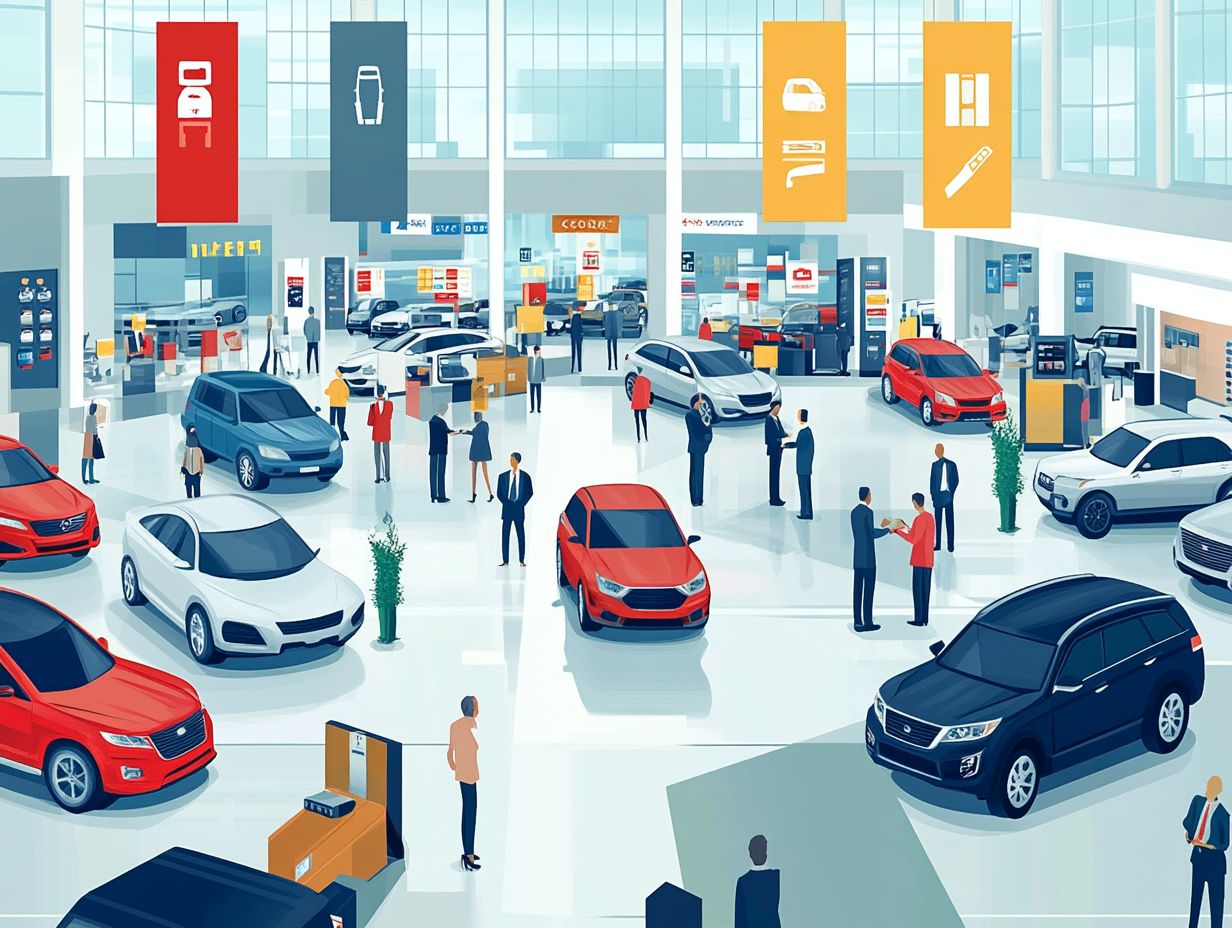Understanding New Car Incentives and Rebates
Navigating the world of car shopping can feel daunting, especially with the multitude of incentives and rebates available.
These financial perks can significantly reduce the cost of your new vehicle. It s essential to understand their nuances and mechanics.
This article will guide you through the various types of incentives and rebates, from manufacturer and dealer offers to common savings opportunities.
You ll discover how to qualify, maximize your savings, and avoid potential pitfalls, ensuring that you re ready to snag amazing deals!
Contents
Key Takeaways:

- Car incentives and rebates are discounts offered by manufacturers or dealers to encourage car purchases.
- These can come in various forms, such as cash back, low interest rates, or discounted prices.
- To qualify, buyers must meet certain requirements and eligibility criteria.
What are Car Incentives and Rebates?
Car incentives and rebates are helpful money-saving options aimed at motivating consumers to purchase vehicles. By understanding these incentives, you can make informed financial decisions and enjoy potential cash back offers and various savings options.
These incentives can vary significantly based on location, the models you re considering, and the dealer promotions available. Staying informed about the options at your disposal when contemplating your next purchase is crucial.
The aim of these incentives is to lower the total cost of acquiring a new car, including options for electric vehicles and hybrids.
Types of Incentives and Rebates
Understanding the diverse array of incentives and rebates available in the automotive market is essential for maximizing your savings when purchasing a new vehicle. To navigate these offers effectively, consider understanding the fine print of new car deals. These incentives are generally divided into manufacturer deals and dealer incentives, each with unique benefits tailored to specific car models and financing options.
Common types of rebates to look out for include:
- Cash back: Money you get back after buying a car.
- Purchase allowances
- Loyalty rebates
Being informed about what to look for can greatly impact your financial decisions, especially when exploring options for electric vehicles and hybrids.
Manufacturer vs. Dealer Incentives
When considering a new vehicle purchase, it s important to know the difference between manufacturer and dealer incentives to make informed financial choices. Manufacturer deals usually come in the form of cash rebates or financing options directly from the automakers. In contrast, dealer cash incentives are offered by dealerships to boost sales of specific car models or inventory.
Understanding these distinctions allows you to fully leverage promotional offers and secure favorable auto financing arrangements.
For example, manufacturers may introduce incentives to clear out older inventory, significantly influencing pricing strategies. Conversely, dealerships may deploy their own incentives to enhance monthly sales figures, opening the door for negotiations on the final purchase price.
Recognizing these differences can profoundly affect your negotiation approach and total cost of ownership. By understanding how each type of incentive operates, you can make informed decisions that align with your financial objectives, maximizing savings while selecting your ideal vehicle.
Ready to explore local offers? Visit dealerships to uncover the best deals available!
Common Types of Rebates

When purchasing a vehicle, you can benefit from various rebates, including cash back, loyalty rebates, and tax credits. These options are designed to enhance your savings and can significantly affect the overall cost of owning a new car.
Understanding the details of these rebates, including eligibility requirements, can help you maximize your savings.
For example, cash back rebates allow you to receive part of your vehicle’s cost back after the purchase, making it more affordable. On the other hand, loyalty rebates reward returning customers, easing your financial burden. Tax credits are also available for eco-friendly vehicles, offering extra savings during tax season.
These rebates not only help with immediate costs but also contribute to long-term savings, enhancing your overall ownership experience. By aligning your choices with available rebates, you can create a more financially savvy purchasing journey.
How to Qualify for Incentives and Rebates
To qualify for car incentives and rebates, you need to understand the specific requirements and criteria set by different manufacturers and dealerships. Factors such as your credit score, down payment, and the type of auto loan can greatly influence your savings opportunities.
Being proactive and well-informed can elevate your financial decisions when purchasing your vehicle.
Requirements and Eligibility
Requirements and eligibility often rely on factors like your credit score, down payment amount, and specific vehicle purchase conditions. Pay close attention to these details to make informed financial decisions and maximize your savings.
Understanding available government rebates for certain car models, especially electric vehicles, can greatly enhance your purchasing experience.
For instance, a higher credit score improves your chances of loan approval and opens doors to better financing offers. The amount of your down payment is also crucial, as it affects your eligibility for various incentives.
It s important to investigate both federal and state-level rebates, as they can vary widely. Some automakers offer their own incentives or discounts, making it essential to explore all available options for financial benefits during the vehicle acquisition process.
Maximizing Savings with Incentives and Rebates
To maximize your savings with car incentives and rebates, adopt a strategic approach and understand how to negotiate and combine offers effectively. You can leverage tips for negotiating dealer incentives and cash-back options to refine your financial decisions during the purchase process.
This mindset will help you lower your overall costs and capitalize on the savings opportunities available to you.
Tips for Negotiating and Combining Offers

Negotiating and combining offers effectively can lead to significant savings during your car buying journey. Equip yourself with knowledge about dealer incentives, cash back opportunities, and loyalty rebates to enhance your financing options and secure the best deal.
Understanding current market trends and vehicle demand will boost your confidence in negotiations. Researching vehicle pricing online helps you determine a fair offer, while exploring local dealership promotions provides insights into seasonal incentives.
When evaluating multiple offers, consider trade-in values and financing rates as well. This comprehensive knowledge enables you to clearly articulate your position and steer negotiations in your favor, ensuring a satisfying purchasing experience.
Check with your dealer today to learn more about available rebates!
Potential Pitfalls to Watch Out For
When navigating car incentives and rebates, be aware of hidden fees and fine print. These can significantly impact your vehicle purchase experience.
Being vigilant helps you make informed financial decisions. It ensures you understand the terms of any incentives offered.
Hidden Fees and Fine Print
Hidden fees and fine print often accompany car incentives. Scrutinizing every detail before making decisions is essential.
By understanding these elements, you can avoid unexpected costs. This way, you can fully take advantage of dealer cash and promotional offers.
For instance, you might miss additional charges like processing fees. Some terms may limit rebate eligibility to specific models or configurations.
These hidden costs can change how appealing an offer seems. It’s vital to compare advertised incentives with the total purchase price, including hidden fees.
This approach helps you navigate financing complexities. It leads to a more informed and confident investment.
Timing Your Purchase
Timing your purchase is key to unlocking the best car incentives. Understanding seasonal trends can enhance your decisions.
Late summer and year-end are often prime shopping periods. Dealerships aim to clear out inventory for new models.
Holidays like Memorial Day and Labor Day often feature special promotions. Stay alert to these cycles for better prices and financing options.
Researching specific brands can give insights into their sales patterns. This allows for a more strategic approach when purchasing your next vehicle.
Frequently Asked Questions
Have questions about car incentives? You’re not alone! Here are some common queries to help you understand better:

What are new car incentives and rebates?
New car incentives and rebates are discounts or special offers provided by car manufacturers and dealerships to encourage customers to purchase a new vehicle. To navigate these offers effectively, it’s helpful to understand the new car buying process. They can come in the form of cash back, low or zero interest financing, or other bonuses.
How do I know if a new car has incentives or rebates?
Incentives and rebates are typically advertised by car manufacturers and dealerships on their websites or in advertisements. You can also ask a salesperson about current offers when you visit a dealership.
What types of incentives and rebates are available?
Some common types of new car incentives and rebates include cash back offers, low or zero interest financing, loyalty bonuses for returning customers, and discounts for certain professions, such as military personnel or first responders.
Do I have to pay back incentives or rebates?
No, incentives and rebates are not loans and do not need to be paid back. They are discounts off the purchase price of a new vehicle.
Are incentives and rebates available for all new cars?
No, incentives and rebates may only be available for certain models or trim levels of new cars. It’s important to check with the manufacturer or dealership to see which vehicles are eligible for current offers.
Do I need to qualify for incentives or rebates?
Yes, some incentives and rebates may have specific requirements or qualifications that need to be met in order to receive the discount. For example, a loyalty bonus may only be available to customers who have previously owned a vehicle from the same manufacturer.






